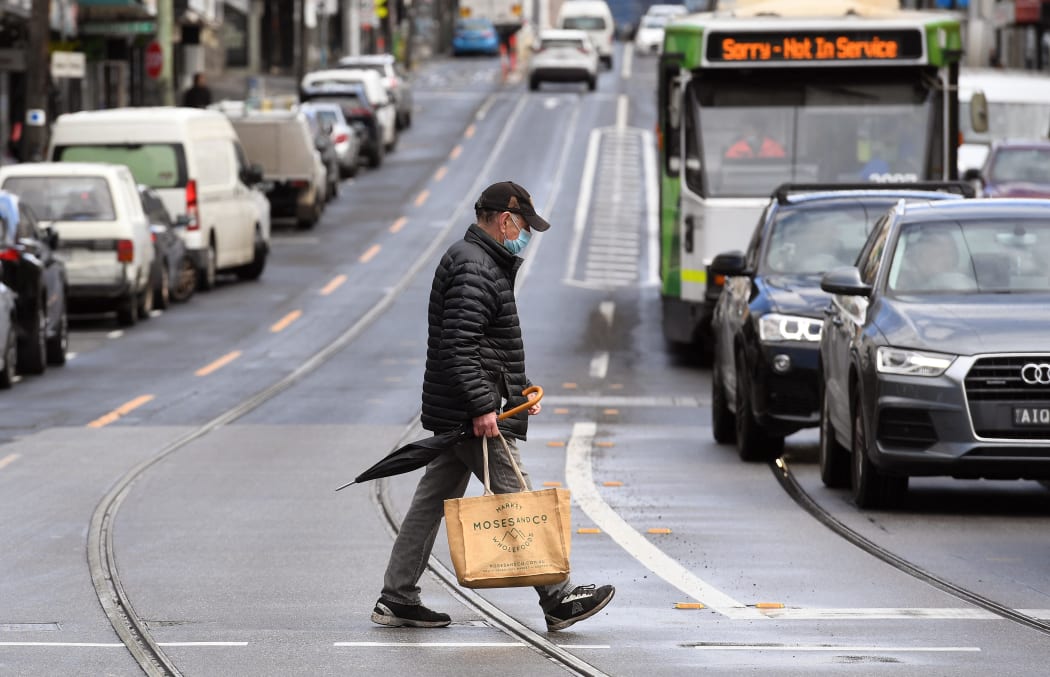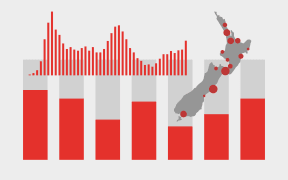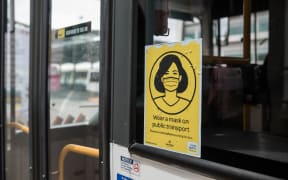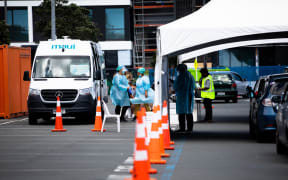New Zealand is now heading into the full Omicron surge, with case numbers expected to skyrocket to a peak and then fall away again - a curve seen everywhere else that has had an Omicron outbreak.
How do we prepare ourselves for the inevitable? New Zealanders who've lived through an Omicron wave elsewhere in the world have some advice.

(file photo) A man crosses a street in Melbourne in October 2021, during a lockdown against Covid-19. Photo: AFP
The days of few Covid cases and a strategy of eliminating community transmission are in the distant past. New Zealand, like many other countries, has a Covid wave ripping through the country.
Rosa Reynolds, a New Zealander living in Melbourne, has already gone through this shift in mentality.
"I'd gone two years-ish without knowing anyone who'd caught Covid, or one friend, by December [2021]. Then by mid-January [2022], I think more of my friends had had it than hadn't," Reynolds said.
It was similar for Dillon Harre, a New Zealand musician in Sydney.
"I don't know if any of my friends didn't have it. I can't think of a single one that didn't catch it. I caught it," Harre said.
He said none of his friends - who are young, relatively healthy, and vaccinated - had any bad symptoms.
Reynolds said it varied in her friend group.
"Any time a friend told me that they had Covid I would be a little bit concerned for them. You never really know how it's going to affect people. Across my friendship group, some people did not have symptoms at all, and some of them got relatively sick, bedridden for a few days... it was just kind of random [who it affected]."
Reynolds said so many people were getting it, shops and businesses would be closed at short notice because they didn't have enough uninfected staff.
"My kid's daycare has shut a few times. The rubbish truck drivers, there must have been some issue there, because our rubbish wasn't getting taken at the right time. There were supply chain issues so the supermarkets didn't have the right stock."
Harre said one of the more surprising difficulties was differences in attitudes towards the virus within households and friend groups.
"I knew a lot of people who had the attitude of 'I just want to catch it over January when there's nothing on so I can get it over with, have a better immunity, and get on with life', and then there were people who said 'That's incredibly irresponsible'. In every house I knew with three or more people, there was some kind of battle like that going on."
As widely as it will spread, not everyone will get it. Epidemiologists expect about half the country to.
New Zealander George Fenwick lived through the Omicron peak in London in December and January.
He was working a retail job and caught public transport everyday - yet somehow managed to avoid it.
"I was expecting to test positive any moment. Especially ... in retail there were people coming in without masks and coughing. Also the fact that I was public transiting every meant that I thought it was an inevitability."
Fenwick said the virus caused its own restrictions, even in the absence of government ones.
"There was a period where no one could hang out anyway. Even if you didn't have Covid, all your friends had it anyway. So there was another weird, self-imposed lockdown there."
Before this wave New Zealand's peak daily case number was 222.
On Thursday there were over 6000 reported, for the first time including results from both rapid antigen and PCR tests, nearly 30 times more.
Psychological shift
Tony Blakely, another New Zealander in Australia, is also an epidemiologist at the University of Melbourne.
"This is a big pivot psychologically and sociologically. You think we've done so well with elimination and now we've got the virus flooding through. The reality is about half the New Zealand and Australian population will be infected by this Omicron. That's okay-ish, as long as we can protect the elderly so they're less likely to be infected," Blakely said.
By mid-March Dr Blakely said we could have hit our peak of possibly 15,000 or 20,000 reported cases a day.
But this will actually mean there's 80,000 to 100,000 infections, Blakely said, with many people not getting a test or not having any symptoms. They will have Covid, but won't be formally counted as a case.
"You or your friends are going to get sick with Omicron. The majority of them will be quite mild, but you'll also notice quite a few of them have relapsing fatigue for a few weeks after - I know I had that myself. But for the vast majority it is quite mild. Again, the trick here is to protect the vulnerable and elderly so they're not the ones that get infected."
So we're staring down a tough couple of months.
"Another way to look at it is we've had a remarkably good few decades living on this planet, and in countries like New Zealand and Australia. Here we go: we've got a pandemic, but we can get our way through it and it will pass."
Blakely said people could prepare by thinking about what they might need if they were sick, such as panadol, or having to isolate, like access to food.







